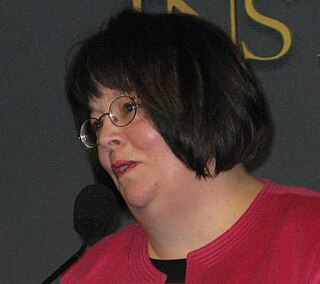Within Christianity, there are a variety of views on sexual orientation and homosexuality. The view that various Bible passages speak of homosexuality as immoral or sinful emerged through its interpretation and has since become entrenched in many Christian denominations through church doctrine and the wording of various translations of the Bible.

Lesbian, gay, bisexual, transgender and queer (LGBTQ) movements are social movements that advocate for LGBTQ people in society. Although there is not a primary or an overarching central organization that represents all LGBTQ people and their interests, numerous LGBTQ rights organizations are active worldwide. The first organization to promote LGBTQ rights was the Scientific-Humanitarian Committee, founded in 1897 in Berlin.
Robert H. Knight is an American conservative writer and activist. He was a draftsman of the federal Defense of Marriage Act, which barred federal recognition of same-sex marriage. DOMA was invalidated by the Supreme Court in United States v. Windsor (2013). He is senior fellow of the American Civil Rights Union and a regular columnist for The Washington Times. He was senior writer for Coral Ridge Ministries and director of the Culture and Media Institute, a project founded in 2006 by the Media Research Center in Alexandria, Virginia. Knight has also served as director of the Culture & Family Institute, an affiliate of Concerned Women for America.

Societal attitudes toward homosexuality vary greatly across different cultures and historical periods, as do attitudes toward sexual desire, activity and relationships in general. All cultures have their own values regarding appropriate and inappropriate sexuality; some sanction same-sex love and sexuality, while others may disapprove of such activities in part. As with heterosexual behaviour, different sets of prescriptions and proscriptions may be given to individuals according to their gender, age, social status or social class.

Margaret Gallagher is an American writer, socially conservative commentator, and activist. She wrote a syndicated column for Universal Press Syndicate from 1995 to 2013 and has written several books. Gallagher founded the Institute for Marriage and Public Policy, a small, socially conservative think tank. She is also a co-founder of the National Organization for Marriage (NOM), an advocacy group which opposes same-sex marriage and other legal recognition of same-sex partnerships; she has served as president and as chairman of the board of NOM.

John Mitchell Finnis is an Australian legal philosopher and jurist specializing in jurisprudence and the philosophy of law. He is an original interpreter of Aristotle and Aquinas, and counts Germain Grisez as a major influence and collaborator. He has made contributions to epistemology, metaphysics, and moral philosophy.

The rights of lesbian, gay, bisexual, transgender, and queer (LGBTQ) people in Singapore have evolved over the decades. Same-sex sexual activity is legal for both males and females; for men it was officially legalised in 2022 after being de facto decriminalised since 2007, and for women it was always legal. Prior to 2022, same-sex sexual activity between males was de jure illegal under the British colonial-era Section 377A of the Penal Code. The law had been de facto unenforced for decades. In February 2022, the Court of Appeal in the Supreme Court reaffirmed that 377A cannot be used to prosecute men for having sex with other men, and that it is "unenforceable in its entirety". Transgender rights in the country are also progressive in the region, which included Singapore being the first country in Asia to legalise sex reassignment surgery in 1973.
Sexual ethics is a branch of philosophy that considers the ethics or morality of sexual behavior. Sexual ethics seeks to understand, evaluate and critique interpersonal relationships and sexual activities from social, cultural, and philosophical perspectives. Some people consider aspects of human sexuality, such as gender identification and sexual orientation, as well as consent, sexual relations and procreation, as giving rise to issues of sexual ethics.

Lesbian, gay, bisexual, and transgender (LGBT) rights in Fiji have evolved rapidly over the years. In 1997, Fiji became the second country in the world after South Africa to explicitly protect against discrimination based on sexual orientation in its Constitution. In 2009, the Constitution was abolished. The new Constitution, promulgated in September 2013, bans discrimination based on sexual orientation and gender identity or expression. However, same-sex marriage remains banned in Fiji and reports of societal discrimination and bullying are not uncommon.

The rights of lesbian, gay, bisexual, transgender, and queer (LGBTQ) people in the United Kingdom of Great Britain and Northern Ireland have developed significantly over time. Today, lesbian, gay and bisexual rights are considered to be advanced by international standards.

Lesbian, gay, bisexual, transgender, and queer (LGBTQ) rights in Australia rank among the highest in the world; having significantly advanced over the latter half of the 20th century and early 21st century. Opinion polls and the Australian Marriage Law Postal Survey indicate widespread popular support for same-sex marriage within the nation. Australia in 2018, in fact was the last of the Five Eyes set of countries - that consisted of namely Canada (2005), New Zealand (2013), United Kingdom (2014) and the United States (2015) to legalize same-sex marriage. A 2013 Pew Research poll found that 79% of Australians agreed that homosexuality should be accepted by society, making it the fifth-most supportive country surveyed in the world. With its long history of LGBTQ activism and annual Gay and Lesbian Mardi Gras festival, Sydney has been named one of the most gay-friendly cities in the world.

Virtually Normal: An Argument About Homosexuality is a book about the politics of homosexuality by the political commentator Andrew Sullivan, in which the author criticizes four different perspectives on gay rights in American society, which he calls the "Prohibitionist", "Liberationist", "Conservative", and "Liberal" views, seeking to expose internal inconsistencies within each of them. He also criticizes the philosopher Michel Foucault and gay rights activists he considers influenced by Foucault, and argues in favor of same-sex marriage and an end to the don't ask, don't tell policy, which banned service by openly gay people in the US military. However, he makes a case against legislation aimed at preventing private discrimination against gay people.

Lesbian, gay, bisexual, and transgender (LGBT) people in Northern Ireland enjoy most of the same rights as non-LGBT people. However, the advancement of LGBT rights has traditionally been slower than the rest of the United Kingdom, with the region having lagged behind England, Scotland, and Wales. Northern Ireland was the last part of the United Kingdom where same-sex sexual activity was decriminalised, the last to implement a blood donation “monogamous no waiting period” policy system for men who have sex with men and, after intervention by the Parliament of the United Kingdom, the last to allow same-sex marriage. Compared to the neighbouring Republic of Ireland, all major LGBT rights milestones had been reached earlier in Northern Ireland, with the exception of same-sex marriage. Homosexuality was decriminalised in Northern Ireland a decade earlier and civil partnerships were introduced six years earlier.
Marriage privatization is the concept that the state should have no authority to define the terms of personal relationships such as marriage. Proponents of marriage privatization, including certain minarchists, anarchists, libertarians, and opponents of government interventionism, claim that such relationships are best defined by private individuals and not the state. Arguments for the privatization of marriage have been offered by a number of scholars and writers. Proponents of marriage privatization often argue that privatizing marriage is a solution to the social controversy over same-sex marriage. Arguments for and against the privatization of marriage span both liberal and conservative political camps.
Many views are held or have been expressed by religious organisation in relation to same-sex marriage. Arguments both in favor of and in opposition to same-sex marriage are often made on religious grounds and/or formulated in terms of religious doctrine. Although many of the world's religions are opposed to same-sex marriage, the number of religious denominations that are conducting same-sex marriages have been increasing since 2010. Religious views on same-sex marriage are closely related to religious views on homosexuality.
In Seventh-day Adventism, homosexual behaviour is considered a violation of God's commands, and as such, openly homosexual behaviour is subject to church discipline. However, "Gay and lesbian members who choose to be, and remain, sexually abstinent should be given the opportunity to participate in all church activities including leadership positions in the Church. Those who struggle with temptation to sin should be treated the same way as other members who struggle with sexual sin. We strongly affirm that homosexual persons have a place in the Seventh-day Adventist Church." The Church's opposition to same-gender sexual practices and relationships is on the grounds that "sexual intimacy belongs only within the marital relationship of a man and a woman." The Church believes the Bible consistently affirms the pattern of heterosexual monogamy, and all sexual relations outside the scope of heterosexual marriage are contrary to God's original plan. Although there are individual churches that welcome openly LGBTQ people, such as the Hollywood Church and the Crosswalk Church, the Seventh-day Adventist's global administrative body, the General Conference of Seventh-day Adventits remains opposed to this.
The political activity of the Catholic Church on LGBTQ issues mainly consists of efforts made by the Catholic Church to support or oppose civil government legislation on issues of importance to LGBTQ people. While the Church has condemned violence against gay and lesbian individuals, it has also, in some countries, opposed efforts to decriminalize homosexuality and resist anti-discrimination measures. The Church advocates for marriage to be legally defined as a union between one man and one woman, thus generally opposing the legalization of same-sex marriages. Opinions on specific LGBTQ issues have been variable and have evolved over time. The Church asserts that certain forms of discrimination against LGBTQ people in some contexts are justifiable in service to the common good.
Raja Fouad Halwani is an American-Lebanese philosopher and professor of philosophy at the School of the Art Institute of Chicago. He is known for his works on philosophy of sex.

Ryan Thomas Anderson is an American religious conservative who is primarily known for his opposition to LGBT rights in the United States, including the legal recognition of same-sex marriage in the United States, laws that ban discrimination against LGBT people, and laws that ban the practice of conversion therapy on children.
Sherif Girgis is an associate professor of law at the University of Notre Dame with expertise in criminal law, constitutional law, constitutional theory, the intersection of law and religion, and philosophy of law. Girgis teaches courses in criminal law, jurisprudence, and constitutional law. He has served as a professor at Notre Dame since 2021.













